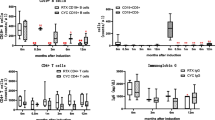Abstract
Antineutrophil cytoplasmic antibody-associated vasculitis (AAV) is a systemic autoimmune disease characterized by necrotizing inflammation of small blood vessels. Glucocorticoids (GC) in combination with rituximab or cyclophosphamide can reduce AAV-related mortality and rescue renal function. However, several side effects associated with these agents, including GC toxicity, are concerning. Avacopan, an inhibitor of the C5a receptor, is now available for AAV treatment and is expected to mitigate GC toxicity. We present a case of myeloperoxidase-antineutrophil cytoplasmic antibody (MPO-ANCA)-positive microscopic polyangiitis (MPA) with rapidly progressive glomerulonephritis treated with an early switch from GC to avacopan in combination with rituximab during induction therapy. Over a 6-month treatment period, clinical remission was achieved and maintained without infection or elevated liver enzyme levels. Efficacy and safety data regarding avacopan for AAV induction therapy remain limited. Therefore, more case reports are required to clarify the role of avacopan in AAV induction and maintenance therapy. Since the MPO-ANCA titer remained elevated despite the clinical remission of AAV in this case, the ANCA titer may not necessarily be a reliable biomarker for predicting AAV relapse when avacopan is applied as an induction therapy for AAV.




Similar content being viewed by others
References
Tan JA, Dehghan N, Chen W, et al. Mortality in ANCA-associated vasculitis; a meta-analysis of observational studies. Ann Rheum Dis. 2017;76:1566–74.
Jayne DRW, Merkel PA, Schall TJ, et al. Avacopan for the treatment of ANCA-associated vasculitis. N Engl J Med. 2021;384:599–609.
van Leeuwen JR, Bredewold OW, van Dam LS, et al. Compassionate use of avacopan in difficult-to-treat antineutrophil cytoplasmic antibody-associated vasculitis. Kidney Int Rep. 2021;7:624–8.
Suppiah R, Robson JC, Grayson PC, et al. 2022 American College of Rheumatology/European Alliance of Associations for Rheumatology classification criteria for microscopic polyangiitis. Ann Rheum Dis. 2022;81:321–6.
Hellmich B, Sanchez-Alamo B, Schirmer JH, et al. EULAR recommendations for the management of ANCA-associated vasculitis: 2022 update. Ann Rheum Dis. 2023. https://doi.org/10.1136/ard-2022-223764.
Cortazar FB, Niles JL, Jayne DRW, et al. Renal recovery for patients with ANCA-associated vasculitis and low eGFR in the ADVOCATE trial of Avacopan. Kidney Int Rep. 2023;8:860–70.
Sada KE, Harigai M, Amano K, et al. Comparison of severity classification in Japanese patients with antineutrophil cytoplasmic antibody-associated vasculitis in a nationwide, prospective, inception cohort study. Mod Rheumatol. 2016;26:730–7.
Turgeon D, Bakowsky V, Baldwin C, et al. CanVasc consensus recommendations for the use of avacopan in antineutrophil cytoplasm antibody-associated vasculitis: 2022 addendum. Rheumatology (Oxford). 2023;21:kead087. https://doi.org/10.3109/14397595.2016.1140274.
Harigai M, Narita I, Suda T, et al. 2023 Clinical practice guidelines of the Japan Research Committee of the Ministry of Health, Labour, and Welfare for Intractable Vasculitis for the management of ANCA-associated vasculitis. SHINDAN TO CHIRYO SHA Inc; 2023
Casal Moura M, Specks U, Tehranian S, et al. Maintenance of remission and risk of relapse in myeloperoxidase-positive ANCA-Associated Vasculitis with Kidney Involvement. Clin J Am Soc Nephrol. 2023;18:47–59.
Chevet B, Cornec D, Casal Moura M, et al. Diagnosing and treating ANCA-associated vasculitis: an updated review for clinical practice. Rheumatology (Oxford). 2023;62:1787–803.
Chen M, Jayne DRW, Zhao MH. Complement in ANCA-associated vasculitis: mechanisms and implications for management. Nat Rev Nephrol. 2017;13:359–67.
Tesar V, Hruskova Z. Complement inhibition in ANCA-associated vasculitis. Front Immunol. 2022;13: 888816.
Abe Y, Minowa K, Kogami M, et al. Avacopan is possibly associated with the improvement of ANCA-associated vasculitis activity without decreasing ANCA titres: a four-case series. Rheumatology (Oxford). 2023;62:e317.
Harigai M, Kaname S, Tamura N, et al. Efficacy and safety of avacopan in Japanese patients with antineutrophil cytoplasmic antibody-associated vasculitis: a subanalysis of a randomized Phase 3 study. Mod Rheumatol. 2023;33:338–45.
Rother RP, Rollins SA, Mojcik CF, et al. Discovery and development of the complement inhibitor eculizumab for the treatment of paroxysmal nocturnal hemoglobinuria. Nat Biotechnol. 2007;25:1256–64.
Kataoka H, Tomita T, Nakanowatari M, et al. Gradual increase of avacopan dose with concomitant ursodeoxycholic acid use may help avoid the risk of C5a receptor inhibitor-induced liver injury in antineutrophil cytoplasmic antibody-associated vasculitis. Mod Rheumatol Case Rep. 2023;7:444–7.
Ennis D, Yeung RS, Pagnoux C. Long-term use and remission of granulomatosis with polyangiitis with the oral C5a receptor inhibitor avacopan. BMJ Case Rep. 2020;13: e236236.
Author information
Authors and Affiliations
Corresponding author
Ethics declarations
Conflict of interest
The authors have declared that no conflict of interest exists.
Informed consent
Informed consent was obtained from all individual participants included in the study.
Research involving human and animal rights
This article does not contain any studies with human participants or animals performed by any of the authors.
Additional information
Publisher's Note
Springer Nature remains neutral with regard to jurisdictional claims in published maps and institutional affiliations.
About this article
Cite this article
Miyake, H., Tanabe, K., Yamaji, S. et al. Early transition to avacopan from glucocorticoids applied during induction therapy for microscopic polyangiitis with rapidly progressive glomerulonephritis. CEN Case Rep (2023). https://doi.org/10.1007/s13730-023-00841-3
Received:
Accepted:
Published:
DOI: https://doi.org/10.1007/s13730-023-00841-3




